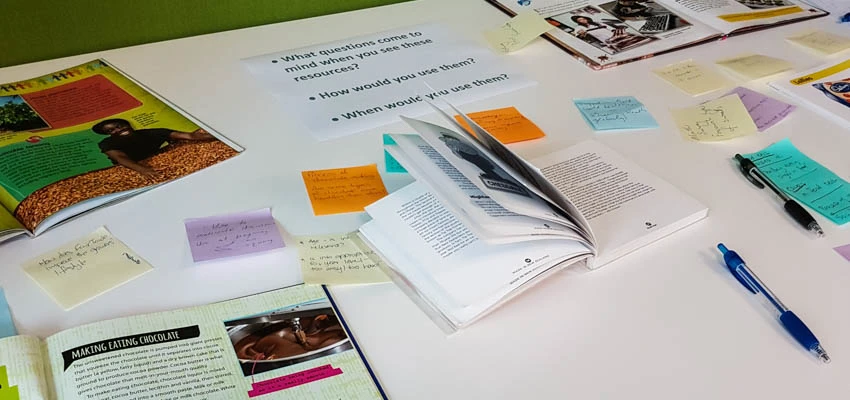School libraries and inquiry learning

The school library is uniquely placed to play a key role in supporting inquiry in your school.
What your school library can provide
Your school library can provide:
skilled staff who can help develop students' inquiry, information, and digital literacy skills
a diverse collection of rich resources
services that include collaborations with teachers to:
provide resources
develop skills
create effective connections with students, whānau, and the local community
a safe and welcoming space to stimulate curiosity, thinking, and creativity.
Inquiry-based learning, school librarian and classroom collaborations, and learning commons make an unbeatable education triumvirate.
— Wallace and Husid, Collaborating for Inquiry-Based Learning (2011)
Staff to help develop students’ inquiry skills
Students develop specific skills when they move through different steps or stages of an inquiry. Teachers and school library staff can model and help teach these skills:
questioning — fertile or essential questions to help clarify what students want to find out about
information literacy and critical literacy — strategies and tools to find, select (evaluate), analyse, and synthesise information
organising and curating information — how to add value by sharing insights about the information they collect
ethical use of others' work — including:
copyright and plagiarism
Creative Commons licencing
attribution
referencing.
Digital content: Finding, evaluating, using, and creating it — key skills for inquiry.
Curating content — a process for gathering and making sense of information.
Copyright and Creative Commons — the ethical and legal use of others' work.
Engaging students in inquiry learning with questions
Good questions can be an effective catalyst for inquiry learning. Constructing and refining questions can help students clarify or define the focus and scope of their inquiry. Many models of effective questions exist, but some to consider include:
Fertile questions — open, undermining, rich, connected, charged, practical.
Writing essential questions (pdf, 42KB) — compiled by the Public Schools of Robeson County, North Carolina, USA.
What are essential questions? — article by American academic Leslie Owen Wilson.
A diverse collection of rich resources
Resources of all kinds play an important part in inquiry-based learning. They can:
inspire inquiry — by sparking curiosity and acting as catalysts for developing questions
inform inquiry — essential for investigating a topic in depth and developing new understanding.
Your school library is a storehouse for collections that support inquiry, including:
physical resources — a collection of printed materials and objects
digital resources — available through the library's online presence
local resources — references to sites, places, or events that can support inquiry
people — access to local experts whose knowledge and insights can inspire or inform inquiry.
By developing a diverse collection of rich resources, you actively support inquiry in your school.
What such a collection looks like
Resources to support inquiry will be:
diverse
in a range of formats
cover a wide variety of subjects, interests, and perspectives
acknowledge and respect the diversity of your community
considers mātauranga Māori (a Māori world view, Māori knowledge, and values)
responsive
reflect teachers' and students' ideas in the selection or creation of resources
provide varied perspectives for in-depth study
be responsive to the changing needs of teachers, students, and the community
accessible
meet the needs of a wide range of learners and learning abilities
incorporate kaitiakitanga (custodianship) of the resources as taonga
be available for easy access either in the physical library space or online.
Services that include collaborations with teachers
Library staff and teachers can better support inquiry learning if they work together and share ideas and knowledge. They can work together:
developing or adopting a school-wide inquiry model
participating in school-wide, long-term planning
planning units of inquiry, such as assessment to identify skills or parts of the inquiry cycle that need extra support
co-teaching or facilitating units of inquiry to be an extra 'guide on the side' for students.
Inquiry exemplars and templates has inquiry exemplars and other teaching plans and templates to inspire and inform learning in your school.
School library staff and teachers can also participate in or lead inquiry-focused learning sessions for colleagues, parents, and whānau. This can help to foster a school-wide culture of inquiry-based learning.
A safe and welcoming space for inquiry
Different spaces help students to use the library for different stages of their inquiry learning. For example, their guided inquiry might use these types of spaces:
Open, immerse, and explore stages — collaborative space where the whole class might watch a video together. They could then brainstorm and discuss ideas that spark from the video.
Identify and gather — quiet spaces or breakout areas where students can work individually or in small groups to find, read, and select (evaluate) information.
Create — collaborative, breakout, or makerspaces where students can work together or alone to build new understanding and express their learning.
Share — presentation or collaborative spaces where students can show or celebrate their inquiry findings.
Find out more
Inquiry: Inquiring minds want to know (pdf, 149KB) — an article by American educator, Barbara Stripling, that explains the role of the library in inquiry. School Library Media Activities Monthly, 25(1), 50–52.
National School Library Standards — an integrated framework for learners, librarians, and school libraries, based on common beliefs, and a set of shared foundations and competencies for learners.
Herring, James E. (2011). Improving students' web use and information literacy: A guide for teachers and teacher librarians. London, UK: Facet Publishing.
Levitov, D. (2016). School libraries, librarians, and inquiry learning. Teacher Librarian, 43(3), 28–35.
Wallace, V., & Husid, W. (2011). Collaborating for inquiry-based learning: School librarians and classroom teachers partner for student achievement. Greenwood Publishing.
Wallace, V., & Husid, W. (2012). Learning to the second power. Teacher Librarian, 39(3), 25–29.